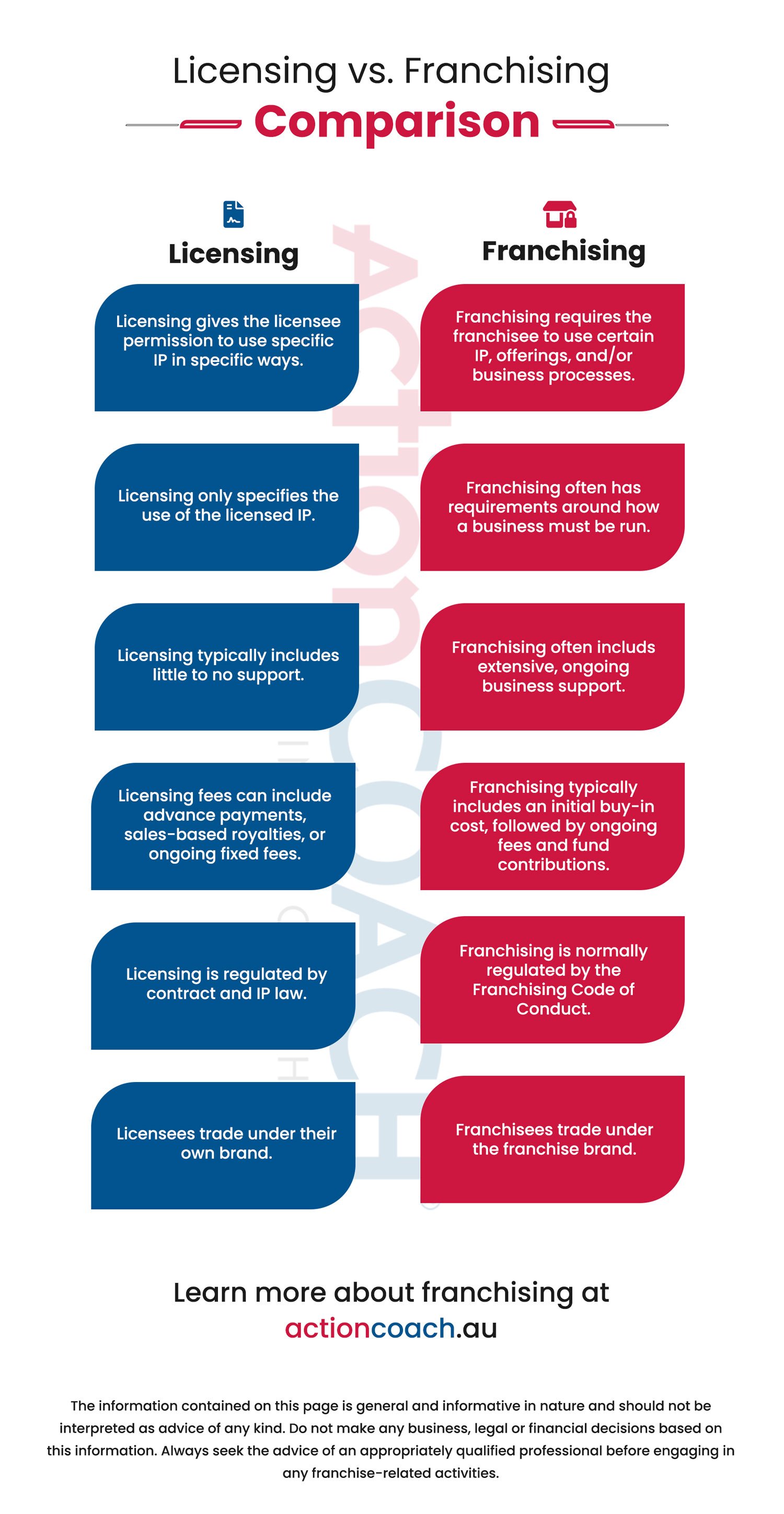Many people wonder what the difference is between licensing and franchising in business. To answer this, let’s start at the basics and understand what both types of businesses are, before comparing one another.
Use the table of contents to quickly jump between sections.
What Is Franchising in Business?
Franchising is a type of business ownership. The prospective business owner (franchisee) will pay the existing brand (franchisor) for the right to use their business or marketing model. By using pre-existing brands, products/services, systems, or marketing, a new franchisee has a better chance of commercial success as compared to creating a new business from scratch.
The cost to become a franchise partner varies greatly. It’s common to pay an initial fee up front and an ongoing fee (known as a royalty fee) over time.
Example of a Franchise
A franchise you’ve probably eaten at before is McDonald’s. Approximately 93% of McDonald’s restaurants are franchised, which means franchisees can pay fees to use the McDonald’s business model and operate in a designated area.
ActionTIP
Franchising success rates are much higher than starting a new business. In fact, they are almost the complete opposite. The failure rate of new businesses is around 50% within the first five years, while franchises often succeed at rates of 80–90% by using a proven model and brand.
What Is Licensing in Business?
Licensing is an agreement where the owner of a product, trademark, brand or some other form of intellectual property (the licensor) permits another party (the licensee) to use a specific piece of intellectual property for a specific purpose.
Licensing agreements are commonly used in manufacturing, distribution and sales.
Example of Licensing
Licensing is very popular with inventors because they can create products and then license the sale of their products to larger brands. Those brands will then add their logos and designs to the products and resell them to customers.
This benefits both parties because the inventor now has their product sold under a recognisable brand, while the brand can skip product development and instead focus on sales and marketing.
ActionTIP
There are many ways licensing fees can be structured. It’s common for licensing fees to include both an upfront fee and a percentage of sales revenue.
Are Licensing and Franchising the Same Thing?
Now that you know what licensing and franchising are, you’ve probably realised that franchising is actually just a type of licensing. Here’s a list of the traits that franchising has in common with regular licensing deals. Both franchising and licensing include:
- a party that owns intellectual property and a party granted permission to use that intellectual property;
- the payment of one-off or ongoing fees or royalties by the licensee/franchisee to the licensor/franchisor;
- specific terms and conditions for use of the licenced intellectual property, including agreement lengths, acceptable uses, and quality control requirements;
- built-in mechanisms that allow a franchisee/licensee to expand without investing resources or taking on additional risk by doing it on their own; and
- a level of trust and collaboration between both parties.
What’s the Difference Between Franchising and Licensing in Business?
Franchising and licensing have lots in common, so let’s dive into the four main differences that separate franchising from regular licensing deals.
1. Control
Franchising agreements often involve a higher level of control by the franchisor. This is done to ensure consistency across all locations, maintain the quality of the product/service, and protect the brand’s reputation.
Regular licensing agreements are often less strict because the licensor is only giving permission to use a specific piece of intellectual property in a specific way. Licensors don’t normally dictate how a business goes to market or operates.
2. Support
Franchising often includes a higher level of support for training, marketing, operations, procurement and more. This can be very beneficial for new business owners or entrepreneurs, who may have limited experience running a business, because it provides proven methods they can follow to become successful. Even for successful entrepreneurs, the support offered by a franchisor can help you achieve your goals faster.
3. Standardised Operations
Most franchise systems improve their business model over time, which leads to their franchisees having standardised operations and procedures – something that licensees rarely get to take advantage of. Franchisees are required to follow guidelines and procedures set by the franchisor. On the other hand, licensees not in a franchise system typically have more flexibility in how they operate their business, which can be helpful for innovation and resilience.
4. Fee Structure
Fee structures can vary a lot between franchising and common licensing deals. Both often feature initial fees and ongoing royalty fees based on sales. Typically, you can expect to pay more for a franchising deal upfront and in ongoing fees, because a franchise agreement normally provides more value than a standard licensing deal.
Regulation Differences Between Franchising and Licensing
One of the major differences between franchising and licensing is how they’re regulated. Licensing agreements are normally fairly standard contracts – licensees can use the product/IP, subject to the conditions that they agree to when signing the contract. As such, licensing agreements are governed by contract and common law, as well as legislation such as the Copyright Act 1968 (Cth).
Franchising agreements, on the other hand, are covered by both those laws and the Franchising Code of Conduct. The code covers areas such as:
- disclosure requirements for parties entering into agreements;
- how franchise agreements work;
- how parties can resolve franchise disputes; and
- the obligation of franchisors to submit their disclosure documents to a federal register.
For example, a franchisor is required to provide a prospective franchisee with both a key facts sheet and a franchise disclosure document before the prospect signs anything. These extra regulations around franchising are designed to protect franchisees from fraud, scams, and other unethical behaviour.
Franchising vs. Licensing: A Direct Comparison

Summary
Even though franchising is a form of licensing in business, it’s very different to other types of licensing deals that exist. Franchisees normally get more support and business benefits (such as established brand IP, processes, training, and marketing collateral) in exchange for paying higher establishment fees and having less control over how their businesses are run.
Knowing which licensing deal is right for you will depend on many factors. If you want to get into business with limited experience, reduce your risk of failure, or grow your business faster, then a franchise model may work well for you.
Want advice about deciding between a franchise and a licensing deal?
The information contained on this page is general and informative in nature and should not be interpreted as advice of any kind. Do not make any business, legal or financial decisions based on this information. Always seek the advice of an appropriately qualified professional before engaging in any franchise-related activities.
April 20, 2023



